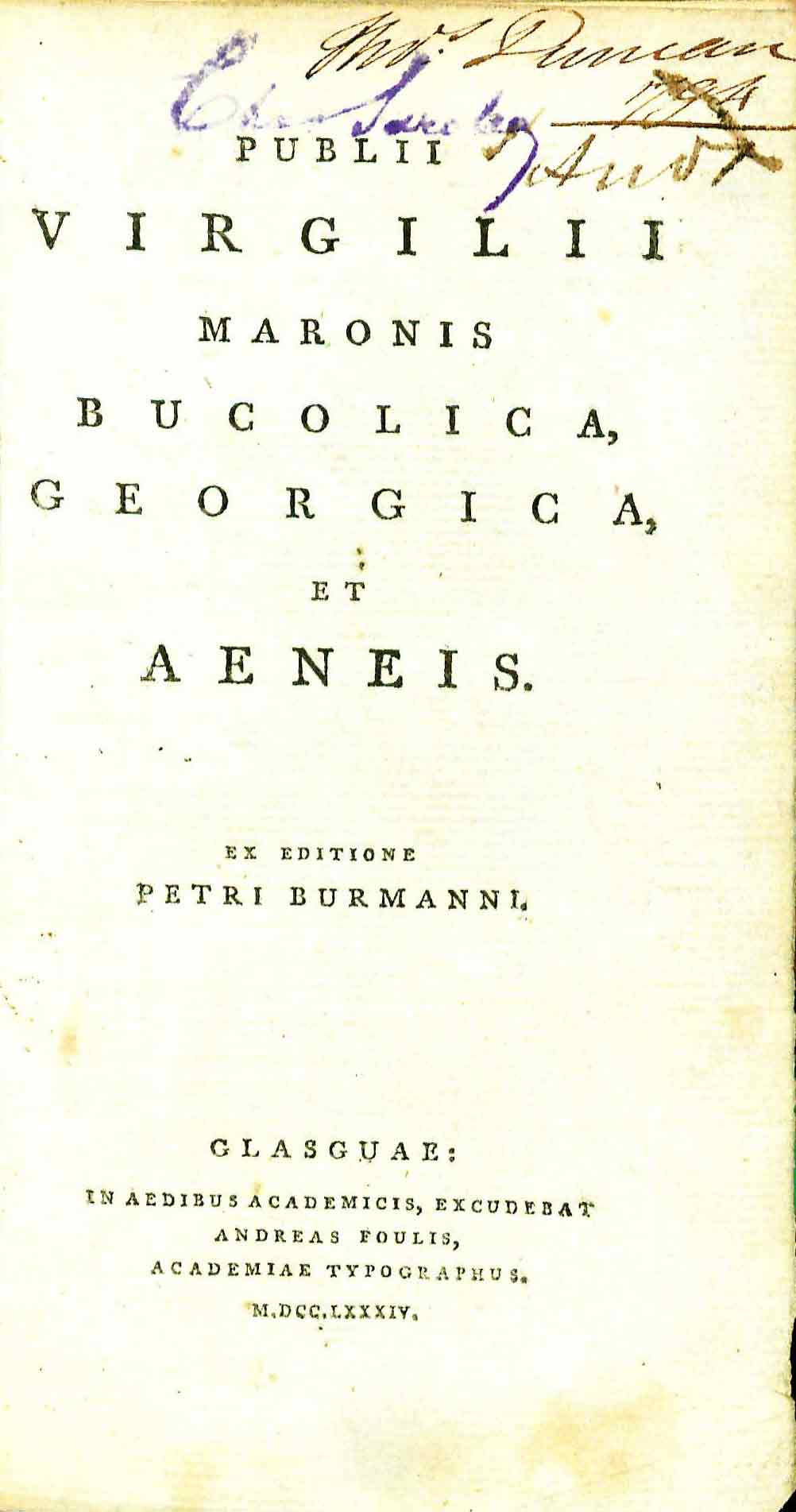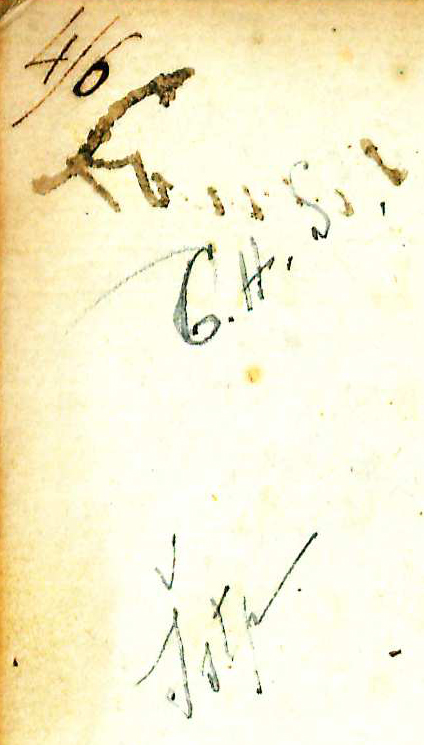Publii Virgilii Maronis Bucolica, Georgica, et Aeneis
by Virgil
| Publii Virgilii Maronis Bucolica, Georgica, et Aeneis | |
|
Title page from Publii Virgilii Maronis Bucolica, Georgica, et Aeneis, George Wythe Collection, Wolf Law Library, College of William & Mary. | |
| Author | Virgil |
| Published | Glasguae: In Aedibus Academicis, excudebat Andreas Foulis, Academiae Typographus |
| Date | 1784 |
| Language | Latin |
Publius Vergilius Maro (70-19 BCE) was a Roman poet born in Cisalpine, Gaul, on the side of the Alps closest to Rome. His family was well-off, enabling his studies at Cremona and Milan, as well as Rome and Naples, the latter under the Epicurean philosopher Siro.[1] When land was confiscated following the battle of Phillippi in 42 BCE for the army veterans of Antony and Octavian, Virgil’s family lost land. They were likely compensated, however, with property near Naples.[2] Virgil’s Eclogues, his first collection of poems, were likely written around that time, perhaps as late as 38 BCE, as the confiscations were a central topic of two of the poems.[3] At some later point, Virgil became part of the poetic circle around Maecenas, putting him in close contact with Octavian, the future emperor Augustus.
Virgil published his Georgics in 29 BCE. Throughout the 20s BCE, both of Virgil’s books of poetry were widely read and distributed.[4] His poems illustrate the greatness of the Roman Empire through “the technical perfection of his verse” and imagery.[5]
This volume contains the three most important of Virgil’s works: the Pastorals (“Bucolics” or “Eclogues”), the Georgics, and the Aeneid. The Pastorals muse on the idyllic life of shepherds in northern Italy.[6] The Georgics are, similarly, meditations on the nature of agriculture. The name “Georgics” refers to the Greek phrase for “working the land” and the word for “farmer.”[7] Where Virgil’s pastoral poems were largely imitative, the focus and depth of his Georgics were unprecedented.[8] The Aeneid is Virgil’s great epic, following the tradition of Homer.[9] The work follows the story of Aeneis, who leaves behind his conquered homeland of Troy and goes on to found the culture that will eventually become Rome. Virgil himself captured the scope of these three works with the inscription on his tombstone, “cecini pascua rura duces” (I sang of farms, fields, and heroes).[10]
Evidence for Inclusion in Wythe's Library
Listed in the Jefferson Inventory of Wythe's Library as [Virgil] Foulis. 12mo. and given by Thomas Jefferson to his grandson Thomas Jefferson Randolph. The precise edition owned by Wythe is unknown. George Wythe's Library[11] on LibraryThing indicates this, adding "Foulis editions in Latin were published in octavo in 1758 and 1784, and in folio in 1778. Three-volume English editions in duodecimo were published in 1769 and 1775." The Brown Bibliography[12] suggests either the Foulis edition of 1758 or 1784 with a slight preference for the former. The Wolf Law Library purchased the 1784, octavo edition.
Description of the Wolf Law Library's copy
Bound in contemporary calf with new backing. Title page includes signatures of former owners "Thos. Duncan, 1794" and "Chas. Saroley."
View this book in William & Mary's online catalog.
References
- Jump up ↑ "Virgil” in The Oxford Companion to Classical Literature, ed. by M.C. Howatson (Oxford: Oxford University Press, 2011).
- Jump up ↑ Ibid.
- Jump up ↑ "Virgil " in Oxford Dictionary of the Classical World, ed. by John Roberts (Oxford: Oxford University Press, 2007)
- Jump up ↑ Ibid.
- Jump up ↑ "Virgil” in The Oxford Companion to Classical Literature.
- Jump up ↑ Virgil, Georgics, trans. Peter Fallon, (Oxford: Oxford University Press, 2009), xiv.
- Jump up ↑ Ibid.
- Jump up ↑ Ibid., xiii.
- Jump up ↑ Virgil, Aeneid, ed. Clyde Pharr, (Wauconda, IL: Bolchazy-Carducci, 2007), 1–4.
- Jump up ↑ Ibid.
- Jump up ↑ LibraryThing, s. v. "Member: George Wythe," accessed on November 13, 2013, http://www.librarything.com/profile/GeorgeWythe
- Jump up ↑ Bennie Brown, "The Library of George Wythe of Williamsburg and Richmond," (unpublished manuscript, May, 2012) Microsoft Word file. Earlier edition available at: https://digitalarchive.wm.edu/handle/10288/13433

